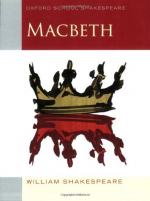|
|
Macbeth Author/Context
William Shakespeare was probably born April 23, 1564. Shakespeare's father, John Shakespeare, was a glover and wool dealer in Stratford who eventually became a town officer until 1577 when scholars conclude that some sort of financial difficulty must have made it impossible for Shakespeare to attend university. Shakespeare's education was limited to the local grammar school at Stratford-on-Avon.
At the age of eighteen, Shakespeare married Ann Hathaway, a woman eight years older than he. Six after their marriage their first daughter, Susanna, was born. In 1585 the twins, Judith and Hamnet, were born. There is a blank spot in Shakespeare's biography between 1585 and 1592 when he became known as a playwright because there is very little documentation of his life at that time. There is much speculation that Shakespeare's marriage was not a happy one because he spent most of the time after establishing himself as a dramatist in London while his wife and children remained in Stratford.
Once Shakespeare made a break into the acting and play-writing world in 1592 with the first three parts of Henry VI, he became a success. Shakespeare also published two poems, Venus and Adonis (1593) and The Rape of Lucrece (1594), that made him known as a poet in addition to his mounting theatrical success. Shakespeare continued that rise to fame when he joined other great actors of the day in an acting company called the Lord Chamberlain's Men. The Lord Chamberlain's Men performed for Queen Elizabeth I on many occasions, and when James I took the English throne in 1603, he granted the Lord Chamberlain's Men a royal patent and they became the King's Men.
Shakespeare died on April 23, 1616 and is buried in the chancel of Trinity Church in Stratford. In 1632, two of Shakespeare's fellow actors published the First Folio, a posthumous collection of his works. This collection contains thirty-six of the thirty-seven plays that make up the Shakespeare canon today.
His works include Henry VI (1589-91), Richard III (1592-1593), The Taming of the Shrew (1593-1594), Richard II (1595), A Midsummer Night's Dream (1595-1596), Romeo and Juliet (1595-1596), Julius Caesar (1599), Hamlet (1600-1601), Othello (1604), King Lear (1605), Antony and Cleopatra (1606-1607), as well as many other historical plays and other minor comedies.
"[C]onsidered as a complete entity, the Shakespeare canon has over the centuries obtained an unparalleled critical significance and has exerted an unprecedented influence on the development of world literature."
"Macbeth survives only in the Folio collection of Shakespeare's work," which suggests that it wasn't one of the more popular plays during Shakespeare's time. But, according to historian Jacob Littleton, Macbeth gained popularity in the late 18th century and early 19th century Gothic era as well as in the late 19th century Victorian era. It is now one of the most frequently performed plays in the world.
Bibliography
"Macbeth." World Literature and Its Times: Profiles of Notable Literary Works and the Historical Events That Influenced Them. Ed. Joyce Moss and Lorraine Valestuk. Vol. 3. Detroit: Gale Research Group, 2001.
"Shakespeare, William." British Authors Before 1800. ed. Stanley Kunitz and Howard Haycraft. New York: The H.W. Wilson Company, 1952.
Wilson, Edmund. "Shakespeare, William." World Literature Criticism: 1500 to present. ed. James P. Draper. vol. 5. Detroit: Gale Research Inc., 1992.




